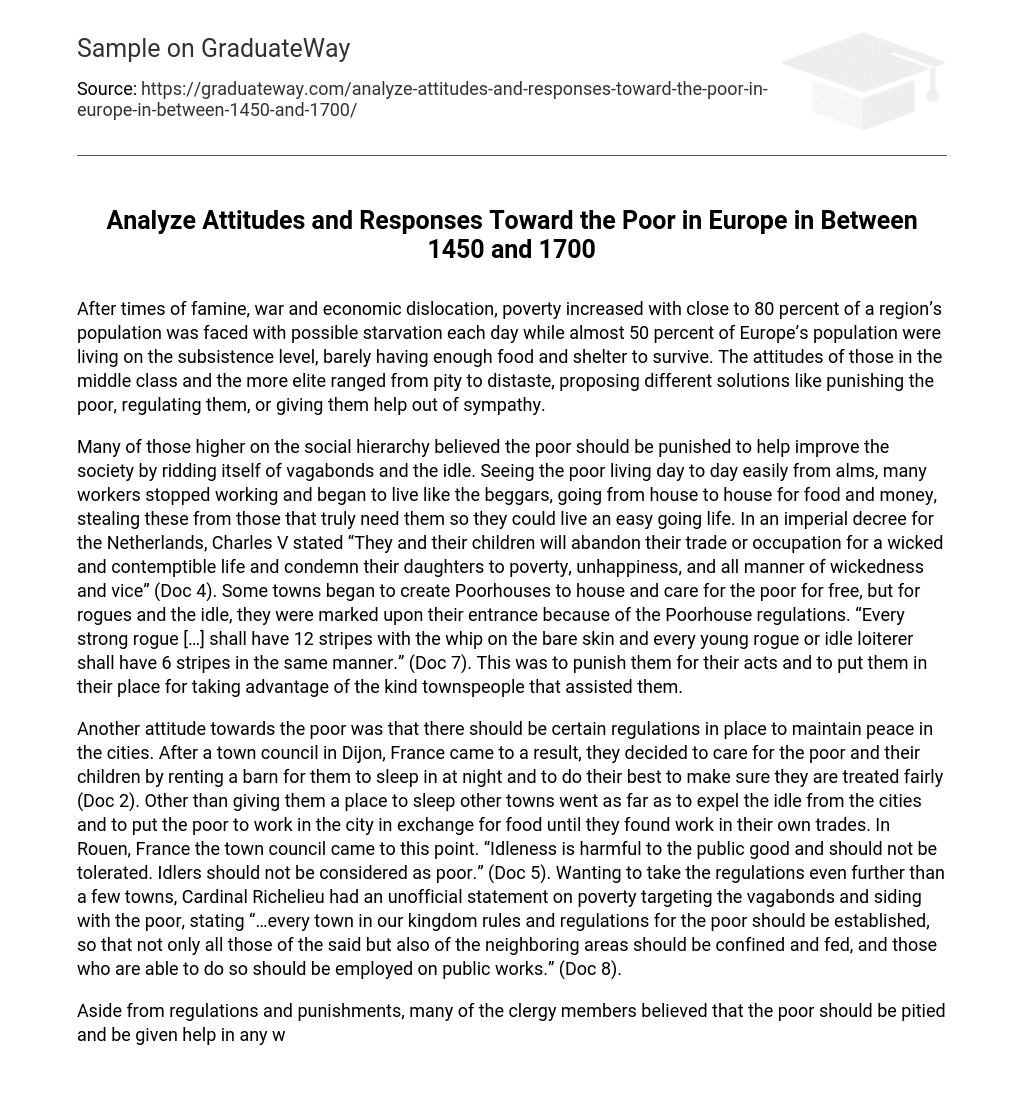After times of famine, war and economic dislocation, poverty increased with close to 80 percent of a region’s population was faced with possible starvation each day while almost 50 percent of Europe’s population were living on the subsistence level, barely having enough food and shelter to survive. The attitudes of those in the middle class and the more elite ranged from pity to distaste, proposing different solutions like punishing the poor, regulating them, or giving them help out of sympathy.
Many of those higher on the social hierarchy believed the poor should be punished to help improve the society by ridding itself of vagabonds and the idle. Seeing the poor living day to day easily from alms, many workers stopped working and began to live like the beggars, going from house to house for food and money, stealing these from those that truly need them so they could live an easy going life. In an imperial decree for the Netherlands, Charles V stated “They and their children will abandon their trade or occupation for a wicked and contemptible life and condemn their daughters to poverty, unhappiness, and all manner of wickedness and vice” (Doc 4). Some towns began to create Poorhouses to house and care for the poor for free, but for rogues and the idle, they were marked upon their entrance because of the Poorhouse regulations. “Every strong rogue […] shall have 12 stripes with the whip on the bare skin and every young rogue or idle loiterer shall have 6 stripes in the same manner.” (Doc 7). This was to punish them for their acts and to put them in their place for taking advantage of the kind townspeople that assisted them.
Another attitude towards the poor was that there should be certain regulations in place to maintain peace in the cities. After a town council in Dijon, France came to a result, they decided to care for the poor and their children by renting a barn for them to sleep in at night and to do their best to make sure they are treated fairly (Doc 2). Other than giving them a place to sleep other towns went as far as to expel the idle from the cities and to put the poor to work in the city in exchange for food until they found work in their own trades. In Rouen, France the town council came to this point. “Idleness is harmful to the public good and should not be tolerated. Idlers should not be considered as poor.” (Doc 5). Wanting to take the regulations even further than a few towns, Cardinal Richelieu had an unofficial statement on poverty targeting the vagabonds and siding with the poor, stating “…every town in our kingdom rules and regulations for the poor should be established, so that not only all those of the said but also of the neighboring areas should be confined and fed, and those who are able to do so should be employed on public works.” (Doc 8).
Aside from regulations and punishments, many of the clergy members believed that the poor should be pitied and be given help in any way possible. Despite the fact that many people knew they had a duty to the poor, they didn’t act because they were unsure when to give. In a book by Spanish humanist, Juan Luis Vives, wrote “Others withdraw because their good intention is embarrassed by the great number…” (Doc 3). This was the case for many people during this time period because of the vast amount of idle and vagabonds in the cities taking what should be for the poor, people did not want to give their alms away to these crooks by mistake. Despite the amount of felons asking for alms, many people were able to see right from wrong and when a family or group of beggars arrived at their door, they would leave with some food or a few coins, as seen in Beggars Receiving Alms at the Door of a House by Rembrandt (Doc 9). When there were members of a religious order that believed it was their duty to evangelize the poor instead of taking care of them, Vincent de Paul the priest and founder of the order spoke up and said “…we must assist the poor and see that they are helped in every possible way. […] it said that what enabled bishops to become saints was their alms-giving.” (Doc 10).
With the limited amount of food and shelter to sustain life created many attitudes towards the poor in Europe; some of which included punishments for those undeserving of charity, regulations to attempt to get countries to help the poor and charity for those in a great need of help to get back on their feet and to start working again.





